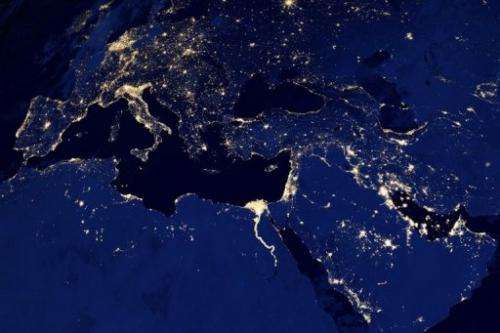Call to cut 'super greenhouse gases'

Phasing out "super greenhouse gases," which mass emitters China and the United States have agreed to restrict, could curb global warming by as much as half a degree Celsius by 2050, a report said Wednesday.
Issued on the sidelines of beleaguered UN climate talks in Bonn, the report said a new Sino-US deal to scale back hydrofluorocarbons (HFCs) "can make a difference".
"Should we succeed in phasing out HFCs, there could be quite large benefits," Bill Hare, director of the Climate Analytics think tank that co-authored the report told journalists in Bonn.
If HFCs were scrapped globally, "it... could result in a reduction of between 0.1 and 0.5 degrees (Celsius—0.18 to 0.9 deg Fahrenheit) warming," he said.
The calculation is based on a worldwide phaseout that by 2020 would spare the atmosphere annual emissions that are equivalent to some 300 million tonnes of carbon dioxide (CO2), or about as much as Spain emits in a year.
HFCs are used in refrigerators, air conditioners and industrial solvents as an alternative to ozone-eating chemicals called chlorofluorocarbons (CFCs) and hydrochlorofluorocarbons (HCFCs).
Driven especially by production in developing countries, HFC emissions have been projected to grow from today's one gigatonne (Gt—a billion tonnes) of CO2 equivalent (CO2e) per year, to between four and nine GtCO2e a year by 2050.
The United States and China are the world's top two emitters of greenhouse gases—together accounting for more than 40 percent.
The report also warned that global warming appeared likely to exceed, perhaps even double, the 2 C (3.6 F) ceiling set for manageable climate change.
Assessing different emissions trend reports, the climate was likely to be 3.8 C warmer by 2100, with a 40 percent chance of it exceeding 4 C, and a 10 percent chance for 5 C, said the report.
"We are coming up with a very disturbing picture," said Hare.
"We are becoming increasingly sceptical that the (governments') pledges are going to be fully implemented."
The report was issued as the latest round of global climate negotiations stumbled in Bonn on the back of Russian procedural objections.
The ongoing UN process, which seeks a new deal by 2015 on curbing Earth-warming greenhouse gas emissions, has been hamstrung from the start by nit-picking, bickering and defence of national interests.
This time, Russia backed by Belarus and Ukraine, has frozen the work of one of three technical bodies, the Subsidiary Body for Implementation (SBI), which is meant to lay important groundwork for the next round of ministerial-level UN climate talks in Warsaw in November.
The SBI is tasked with measuring progress towards reducing climate-altering emissions and drafting the next budget for the secretariat of the UN Framework Convention on Climate Change (UNFCCC), under whose auspices the negotiations take place.
Moscow is incensed by the way the last big annual meeting, held in Doha, Qatar, closed last December—its objections ignored by the conference's Qatari chairman, who gavelled through a deal that extended the Kyoto Protocol on curbing Earth-warming greenhouse gas emissions.
The Doha decision hamstrung Moscow's planned sale of 5.8 billion tonnes of carbon credits amassed under the protocol's first round, which expired at end of last year.
© 2013 AFP




















